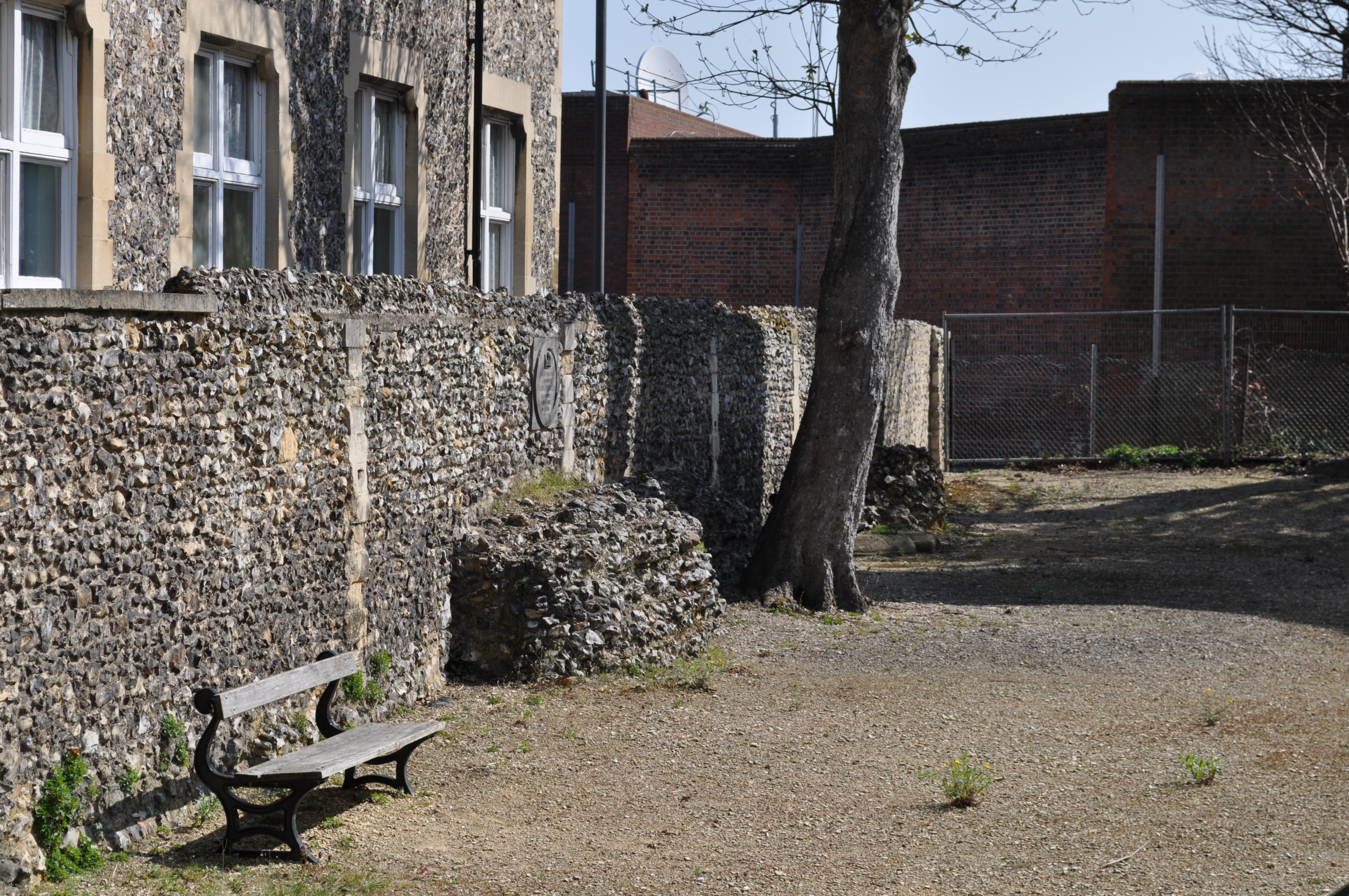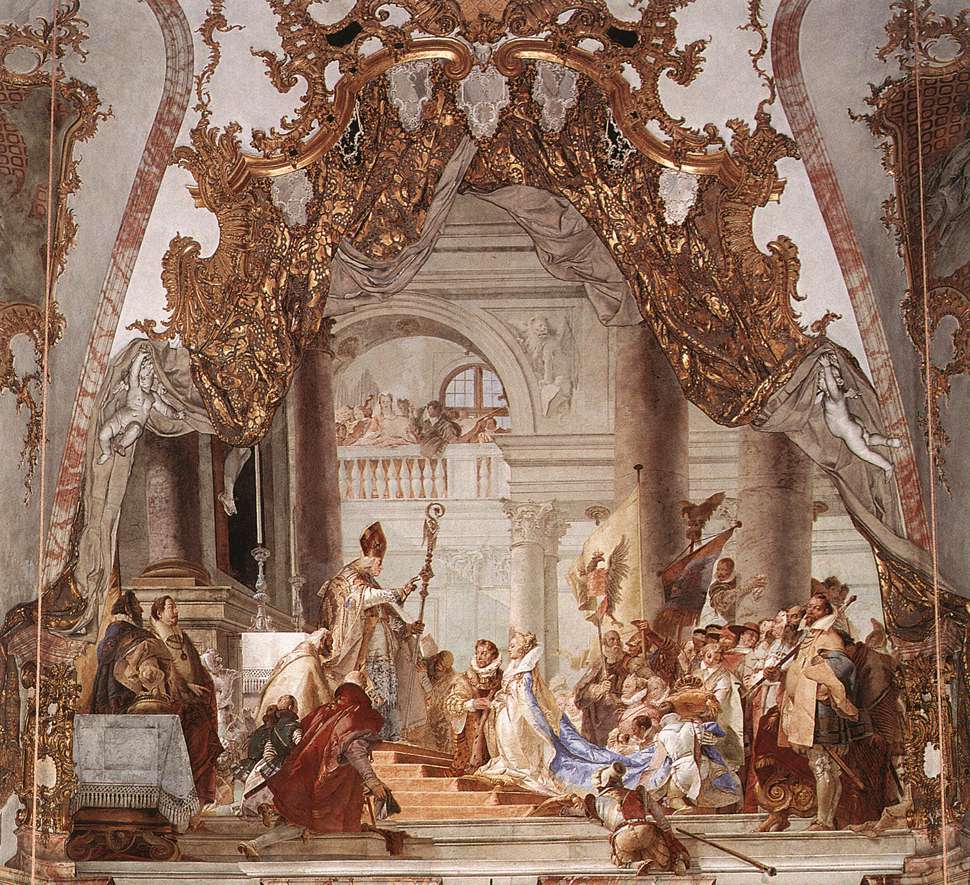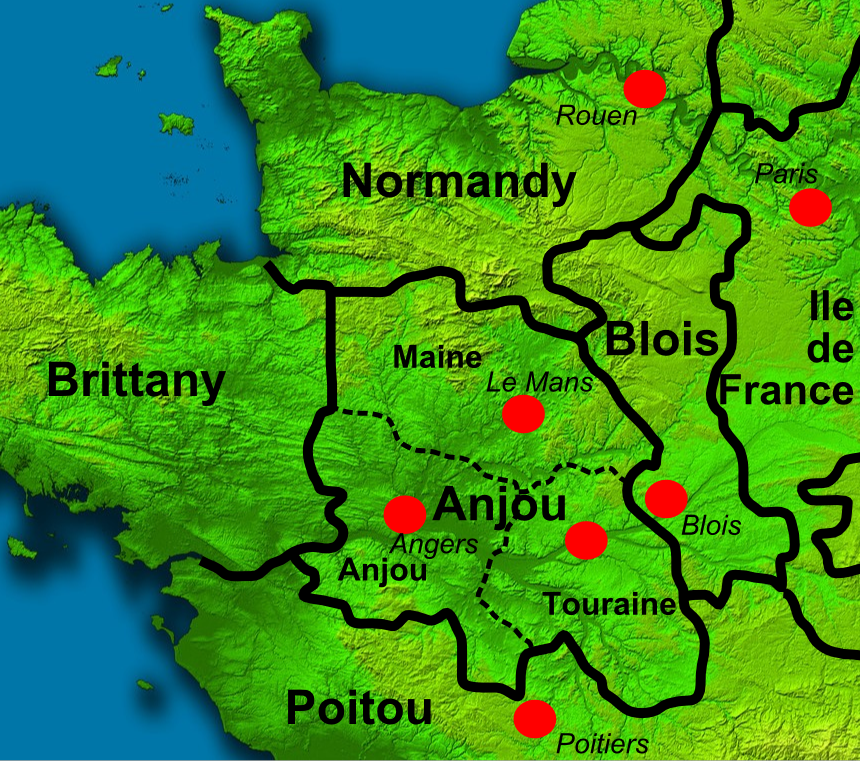|
William IX, Count Of Poitiers
William, Count of Poitiers (17 August 1153 – 1156) was the first son of King Henry II of England and Duchess Eleanor of Aquitaine. William is reported to have died either at the age of 2 in April 1156, or at the age of 3 on 2 December 1156, after suffering a seizure at Wallingford Castle. He was buried in Reading Abbey at the feet of his great-grandfather Henry I. Notes References Sources * * * * * {{DEFAULTSORT:William 09, Count of Poitiers 1153 births 1156 deaths 12th-century English people English heirs apparent who never acceded William Burials at Reading Abbey William William is a masculine given name of Germanic languages, Germanic origin. It became popular in England after the Norman Conquest, Norman conquest in 1066,All Things William"Meaning & Origin of the Name"/ref> and remained so throughout the Middle ... Children of Henry II of England Monarchs who died as children Sons of kings English princes English royalty who died as children ... [...More Info...] [...Related Items...] OR: [Wikipedia] [Google] [Baidu] |
House Of Plantagenet
The House of Plantagenet (Help:IPA/English, /plænˈtædʒənət/ Help:Pronunciation respelling key, ''plan-TAJ-ə-nət'') was a royal house which originated from the Medieval France, French county of Anjou. The name Plantagenet is used by modern historians to identify four distinct royal houses: the Angevin kings of England, Angevins, who were also counts of Anjou; the main line of the Plantagenets following the loss of Anjou; and the Houses of House of Lancaster, Lancaster and House of York, York, two of the Plantagenets’ Cadet branch, cadet branches. The family held the English throne from 1154, with the accession of Henry II of England, Henry II, until 1485, when Richard III of England, Richard III died in battle. England was transformed under the Plantagenets, although only partly intentionally. The Plantagenet kings were often forced to negotiate compromises such as Magna Carta, which constrained royal power in return for financial and military support. The king was no ... [...More Info...] [...Related Items...] OR: [Wikipedia] [Google] [Baidu] |
1153 Births
Year 1153 ( MCLIII) was a common year starting on Thursday of the Julian calendar. Events By place Byzantine Empire * Spring – Andronikos I Komnenos, son of Isaac Komnenos, is imprisoned in the imperial palace for conspiring against his uncle, Emperor Manuel I (Komenenos) at Constantinople. Levant * August 19 – Siege of Ascalon: King Baldwin III of Jerusalem captures Ascalon, the last Fatimid fortress in Palestine. The citizens are allowed to leave in peace and return to Egypt. * Raynald of Châtillon, a French nobleman, marries Constance of Antioch (after given permission by Baldwin III) and becomes Prince of Antioch. Britain * Spring – The 19-year-old Henry II of England lands with a Norman fleet (some 40 ships) on the south coast of England. He defeats King Stephen (a cousin of his mother, Queen Matilda) with a small army at Malmesbury. Henry travels north through the Midlands, while a temporary truce is accepted. Robert de Beaumont, 2nd ... [...More Info...] [...Related Items...] OR: [Wikipedia] [Google] [Baidu] |
Sons Of Kings
A son is a male offspring; a boy or a man in relation to his parents. The female counterpart is a daughter. From a biological perspective, a son constitutes a first degree relative. Social issues In pre-industrial societies and some current countries with agriculture-based economies, a higher value was, and still is, assigned to sons rather than daughters, giving males higher social status, because males were physically stronger, and could perform farming tasks more effectively. In China, a one-child policy was in effect until 2015 in order to address rapid population growth. Official birth records showed a rise in the level of male births since the policy was brought into law. This was attributed to a number of factors, including the illegal practice of sex-selective abortion and widespread under-reporting of female births. In patrilineal societies, sons will customarily inherit an estate before daughters. In some cultures, the eldest son has special privileges. For ex ... [...More Info...] [...Related Items...] OR: [Wikipedia] [Google] [Baidu] |
Monarchs Who Died As Children
A monarch () is a head of stateWebster's II New College Dictionary. "Monarch". Houghton Mifflin. Boston. 2001. p. 707. for life or until abdication, and therefore the head of state of a monarchy. A monarch may exercise the highest authority and power in the state, or others may wield that power on behalf of the monarch. Usually, a monarch either personally inherits the lawful right to exercise the state's sovereign rights (often referred to as ''the throne'' or ''the crown'') or is selected by an established process from a family or cohort eligible to provide the nation's monarch. Alternatively, an individual may proclaim oneself monarch, which may be backed and legitimated through acclamation, right of conquest or a combination of means. If a young child is crowned the monarch, then a regent is often appointed to govern until the monarch reaches the requisite adult age to rule. Monarchs' actual powers vary from one monarchy to another and in different eras; on one extreme, ... [...More Info...] [...Related Items...] OR: [Wikipedia] [Google] [Baidu] |
Children Of Henry II Of England
A child () is a human being between the stages of childbirth, birth and puberty, or between the Development of the human body, developmental period of infancy and puberty. The term may also refer to an unborn human being. In English-speaking countries, the legal definition of ''child'' generally refers to a minor (law), minor, in this case as a person younger than the local age of majority (there are exceptions such as, for example, the consume and purchase of alcoholic beverage even after said age of majority), regardless of their physical, mental and sexual development as biological adults. Children generally have fewer Children's rights, rights and responsibilities than adults. They are generally classed as unable to make serious decisions. ''Child'' may also describe a relationship with a parent (such as sons and daughters of any age) or, Metaphor, metaphorically, an authority figure, or signify group membership in a clan, tribe, or religion; it can also signify being str ... [...More Info...] [...Related Items...] OR: [Wikipedia] [Google] [Baidu] |
House Of Anjou
Angevin or House of Anjou may refer to: *County of Anjou or Duchy of Anjou, a historical county, and later Duchy, in France **Angevin (language), the traditional langue d'oïl spoken in Anjou **Counts and Dukes of Anjou *House of Ingelger, a Frankish noble family who were counts of Anjou between the 10th and 12th centuries, their female-line descendants (through Ermengarde, Duchess of Burgundy) made up the Angevin Plantagenets *Angevin kings of England (Plantagenet), members of the House of Anjou who occupied the English throne in the 12th and early 13th centuries, their female-line descendants (through Eleanor of England, Queen of Castile) made up the Capetian Angevins **Angevin Empire, the assemblage of territories in Britain and France ruled by the Angevin kings of England * Angevin kings of Jerusalem, members of the House of Anjou who occupied the throne of the Kingdom of Jerusalem in the 12th century, relatives of the Angevin kings of England *Capetian House of Anjou, a cadet br ... [...More Info...] [...Related Items...] OR: [Wikipedia] [Google] [Baidu] |
Burials At Reading Abbey
Burial, also known as interment or inhumation, is a method of final disposition whereby a dead body is placed into the ground, sometimes with objects. This is usually accomplished by excavating a pit or trench, placing the deceased and objects in it, and covering it over. A funeral is a ceremony that accompanies the final disposition. Evidence suggests that some archaic and early modern humans buried their dead. Burial is often seen as indicating respect for the dead. It has been used to prevent the odor of decay, to give family members closure and prevent them from witnessing the decomposition of their loved ones, and in many cultures it has been seen as a necessary step for the deceased to enter the afterlife or to give back to the cycle of life. Methods of burial may be heavily ritualized and can include natural burial (sometimes called "green burial"); embalming or mummification; and the use of containers for the dead, such as shrouds, coffins, grave liners, and burial ... [...More Info...] [...Related Items...] OR: [Wikipedia] [Google] [Baidu] |
English Heirs Apparent Who Never Acceded
English usually refers to: * English language * English people English may also refer to: Culture, language and peoples * ''English'', an adjective for something of, from, or related to England * ''English'', an Amish term for non-Amish, regardless of ethnicity * English studies, the study of English language and literature Media * ''English'' (2013 film), a Malayalam-language film * ''English'' (novel), a Chinese book by Wang Gang ** ''English'' (2018 film), a Chinese adaptation * ''The English'' (TV series), a 2022 Western-genre miniseries * ''English'' (play), a 2022 play by Sanaz Toossi People and fictional characters * English (surname), a list of people and fictional characters * English Fisher (1928–2011), American boxing coach * English Gardner (born 1992), American track and field sprinter * English McConnell (1882–1928), Irish footballer * Aiden English, a ring name of Matthew Rehwoldt (born 1987), American former professional wrestler ... [...More Info...] [...Related Items...] OR: [Wikipedia] [Google] [Baidu] |
12th-century English People
1 (one, unit, unity) is a number, Numeral (linguistics), numeral, and glyph. It is the first and smallest Positive number, positive integer of the infinite sequence of natural numbers. This fundamental property has led to its unique uses in other fields, ranging from science to sports, where it commonly denotes the first, leading, or top thing in a group. 1 is the unit (measurement), unit of counting or measurement, a determiner for singular nouns, and a gender-neutral pronoun. Historically, the representation of 1 evolved from ancient Sumerian and Babylonian symbols to the modern Arabic numeral. In mathematics, 1 is the multiplicative identity, meaning that any number multiplied by 1 equals the same number. 1 is by convention not considered a prime number. In Digital electronics, digital technology, 1 represents the "on" state in binary code, the foundation of computing. Philosophically, 1 symbolizes the ultimate reality or source of existence in various traditions. In math ... [...More Info...] [...Related Items...] OR: [Wikipedia] [Google] [Baidu] |
1156 Deaths
Year 1156 ( MCLVI) was a leap year starting on Sunday of the Julian calendar. Events By place Levant * Spring – Raynald of Châtillon, prince of Antioch, makes an alliance with Thoros II (the Great), ruler of Armenian Cilicia. He invades Cyprus and conducts a widespread plundering of the Byzantine island. The Crusaders and the Armenian forces march up and down the island robbing and pillaging every building, church and convent as well as shops and private houses. The crops are burnt; the herds are rounded up – together with all the population – and driven down to the coast. The massacre lasts about three weeks; on the rumor of a Byzantine fleet in the offing, Raynald gives the order for embarkation. The Crusader ships are loaded with booty, and every Cypriot is forced to ransom himself. Europe * January 20 – Freeholder Lalli slays the English missionary-bishop Henry with an axe, on the ice of Lake Köyliönjärvi in Finland (according to legend ... [...More Info...] [...Related Items...] OR: [Wikipedia] [Google] [Baidu] |
Grave Of King Henry I At Reading Abbey
A grave is a location where a dead body (typically that of a human, although sometimes that of an animal) is buried or interred after a funeral. Graves are usually located in special areas set aside for the purpose of burial, such as graveyards or cemeteries. In some religions, it is believed that the body must be burned or cremated for the soul to survive; in others, the complete decomposition of the body is considered to be important for the rest of the soul (see bereavement). Description The formal use of a grave involves several steps with associated terminology. ;Grave cut The excavation that forms the grave. Excavations vary from a shallow scraping to removal of topsoil to a depth of or more where a vault or burial chamber is to be constructed. However, most modern graves in the United States are only deep as the casket is placed into a concrete box (see burial vault) to prevent a sinkhole, to ensure the grave is strong enough to be driven over, and to prevent ... [...More Info...] [...Related Items...] OR: [Wikipedia] [Google] [Baidu] |
House Of Angevin
The Angevins (; "of/from Anjou") were a royal house of Anglo-French origin that ruled England and Ireland and in France in the 12th and early 13th centuries; its monarchs were Henry II, Richard I and John. Henry II won control of a vast assemblage of lands in western Europe that would last for 80 years and would retrospectively be referred to as the Angevin Empire. As a political entity this was structurally different from the preceding Norman and subsequent Plantagenet realms. Geoffrey of Anjou became Duke of Normandy in 1144 and died in 1151. In 1152, his heir, Henry, added Aquitaine by virtue of his marriage to Eleanor of Aquitaine. Henry also inherited the claim of his mother, Empress Matilda, the daughter of King Henry I of England and Matilda of Scotland (who was also the remaining descendant of the royal House of Wessex), to the English throne, to which Henry II succeeded in 1154 following the death of Matilda's cousin Stephen. In 1189, Henry was succeeded by his third s ... [...More Info...] [...Related Items...] OR: [Wikipedia] [Google] [Baidu] |





